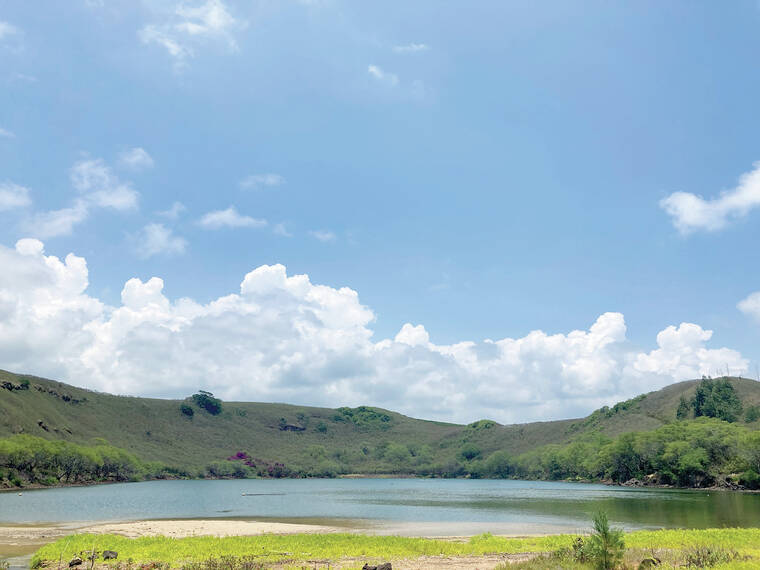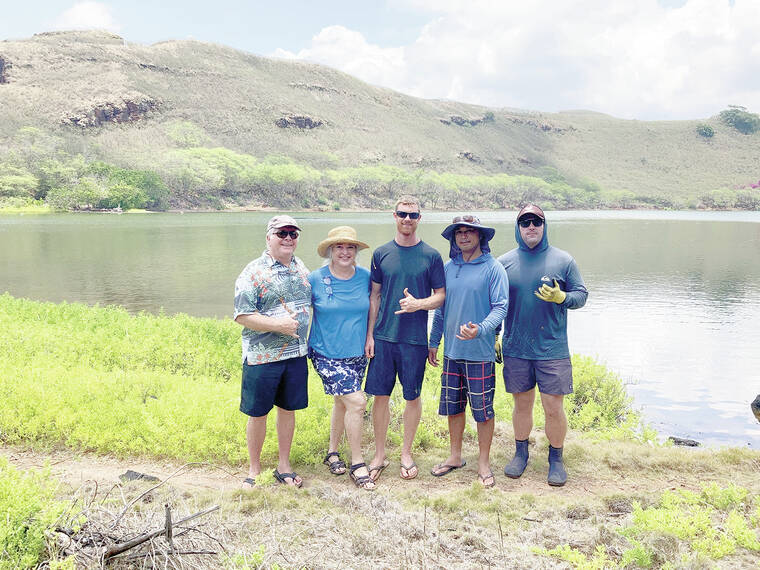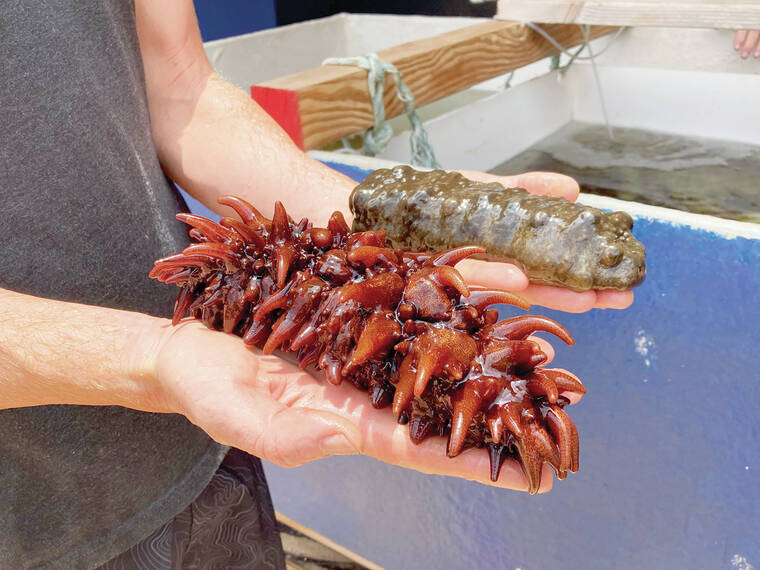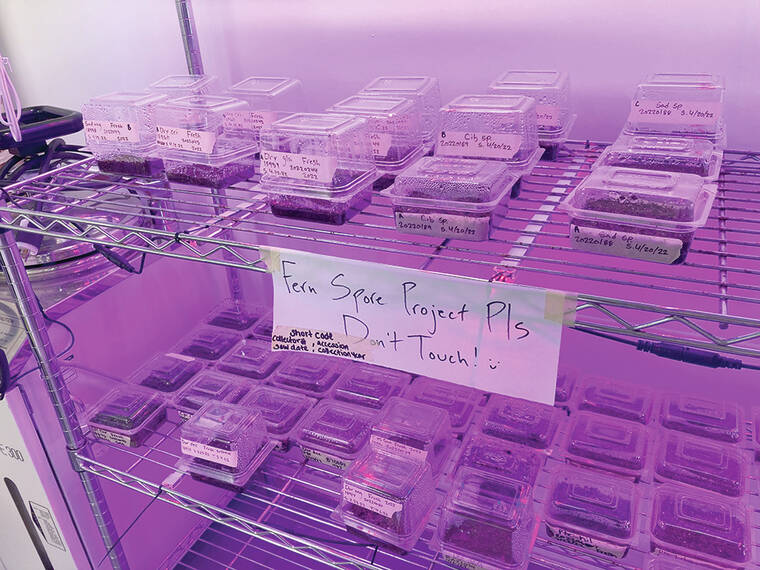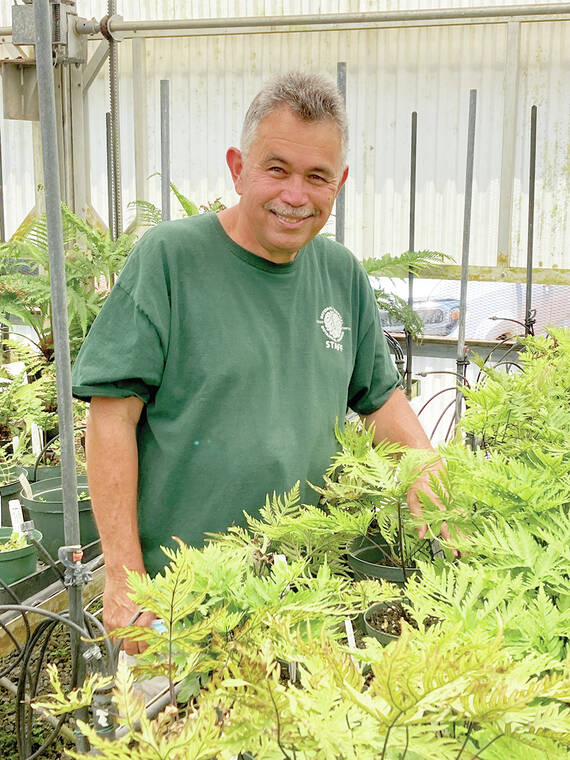KALAHEO — Two South Shore groups are using recently acquired Kaua‘i County Innovation Grants to restore the island, both mauka and makai.
The commercial Kaua‘i Sea Farm, which tends the historic Nomilo Fishpond, is promoting aquaculture rooted in Native Hawaiian tradition and contemporary science.
Farther inland, the nonprofit National Tropical Botanical Garden is becoming the first entity on Kaua‘i to propagate native fern species from spores.
Mike DeMotta, a NTBG horticulturalist, radiated enthusiasm during a recent tour of the Kalaheo headquarters.
“Typically, people would grow ferns from clonal reproduction, which is taking rhizome cuttings, for example, and just replanting from that — taking divisions, basically,” DeMotta explained.
“There are no other nurseries here growing ferns from spores, particularly for the conservation of the native species, some of the rarer ones,” he continued. “We’re the first, and we have to develop the protocols, because no two fern species grow exactly the same.”
Ferns play an important role in watersheds by absorbing water and thereby mitigating runoff.
Native ferns now growing at NTBG include palapalai (Microlepia strigosa), hapu‘u (Cibotium glaucum) and ‘ama‘u (Sadleria cyathioides), among many others.
NTBG’s top priority is propagation: Partners including the state Department of Land and Natural Resources Division of Forestry and Wildlife will outplant NTBG’s native ferns throughout Kaua‘i.
The fern specialists have other goals, as well. DeMotta hopes to boost the availability and popularity of native ferns among Kaua‘i landscapers, homeowners and gardeners.
Doing so could steer buyers away from non-native species that have proven to be invasive.
“The Australian tree fern in the watersheds around the North Shore is a classic example,” DeMotta said. “They are dominating areas of the wet forest back in Hanalei and Wainiha.”
The fern-spore project also boasts a “long-shot” goal.
NTBG’s $50,000 Innovation Grant will, in part, allow experts to collect spores from decades-old fern specimens held in the center’s herbarium.
If the experiment’s spores prove viable, NTBG could potentially revive Kaua‘i fern populations extinct in the wild.
Kaua‘i Sea Farm
Less than two miles from the NTBG’s sprawling South Shore headquarters, a much smaller — but no less ambitious — operation is underway.
Kaua‘i Sea Farm’s Nomilo Fishpond is stewarded by Lynn Maile Taylor, husband Thayne Taylor and a small team of employees and partners including Production Manager Dave Anderson.
The farmers’ bywords are “restorative aquaculture,” a term for methods directly benefiting the natural ecosystem around them.
They believe they can help build a better future for Kaua‘i by looking back to time-honored Hawaiian practices.
“We have fish, we’ve got clams and oysters, we’ve got seaweed. We’ve got all these things that naturally occur in the pond,” Thayne Taylor, a lifelong entrepreneur, said.
“To maintain that balance not only helps the pond thrive, but also the fisheries around the coast survive — which in turn helps out other animals as well as the economy of our own island and food security.”
The Taylors’ 18-acre, 25-foot-deep fishpond fills the center of an ancient cinder cone located on the makai side of Kaua‘i Coffee Company’s Kalaheo estate.
Lynn Taylor’s grandfather, Native Hawaiian Philip K. Palama Sr., acquired the property more than 100 years ago when he purchased it from his employer Walter McBride.
Kaua‘i Sea Farm has now spent years restoring the pond’s native ecosystem and traditional infrastructure, while investing in contemporary technology.
Anderson manages a 100% solar-powered facility near the pond’s edge that houses a complex water-filtration system used to cultivate hard clams (Mercenaria mercenaria, raised nowhere else in Hawai‘i), and three varieties of oysters from seed.
A nearby tub contained the remains of a recent limu (seaweed) harvest during a recent visit. And several feet beyond, another open-air tank contained at least two species of sea cucumber, high-demand delicacies with reputations as living water-filtration systems.
Kaua‘i Sea Farm’s $49,213 Innovation Grant, which it earned through a partnership with conservation nonprofit Ho‘omalu Ke Kai, will promote these projects and others.
The Taylors believe the Nomilo Fishpond can become a blueprint for other Hawai‘i growers.
“Moving forward, it can be a real tool bringing a lot of positive things to the island of Kaua‘i besides tourism,” Lynn Taylor said.
“We want to continue to really be part of the community and do the best we can to bring good food and good-paying jobs.”
•••
Scott Yunker, reporter, can be reached at 245-0437 or syunker@thegardenisland.com.
